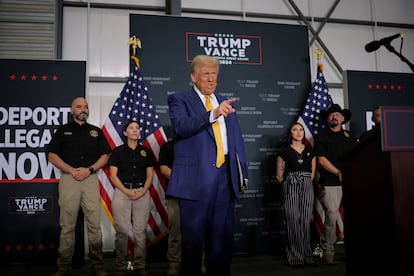Trump defies US laws with his immigration promises
The tycoon faces ethical and legal barriers to achieving his anti-immigration goals, such as revoking birthright citizenship or raiding schools


January 20 will be the starting point for a long list of measures that president-elect Donald Trump has prepared against immigrants, ranging from the mass deportation of undocumented individuals to the withdrawal of citizenship from people who were born in the country. His intentions are clear, but whether he can carry them out is not so evident. The Republican has even said that he would like to be a dictator for a day, and that might in fact be the only way to carry out some of his promises, because many of them challenge laws in force since the 19th century, in addition to the logistical, political and ethical problems that are raised.
Perhaps the most controversial issue of all is the withdrawal of birthright citizenship. In his first interview after the election victory, given to NBC, when asked if he intended to push through the measure on day one, Trump replied: “Yes, absolutely.” To do so, he would have to bypass the 14th Amendment, which since 1870 grants citizenship to anyone born in the country, with the sole exception of the children of diplomats.
An executive order by the president cannot change the Constitution, although there is the possibility that he could reinterpret the amendment when it says that the right belongs to people who are “under the jurisdiction of the State.”
Trump would have to justify that, because they are children of undocumented immigrants who are not in the country legally, they are not subject to the jurisdiction of the State. The case would almost certainly end up before the Supreme Court. “It would be the most radical thing the Court has done,” says Hiroshi Motomura, a law professor at UCLA. The 14th Amendment was passed after the American Civil War and eliminating it “would revoke 160 years of history. Its purpose and role in history was to understand the country as a nation of immigrants, which at the time was a very progressive change,” he adds.
Trump is favored by the fact that the Supreme Court has a majority of conservative judges (six to three), three of whom he appointed himself. Such a drastic change in the interpretation of the Constitution does not seem very likely, but the Court’s jurisprudence raises doubts. “We have already seen how the Supreme Court acted in the case of Roe v. Wade. There is uncertainty about what it would do in this case,” says Adriel Orozco, a lawyer for the American Immigration Council, an organization dedicated to the defense of migrants.
Another option would be to add a new amendment to the Constitution, but that would require a two-thirds majority in Congress, which is almost impossible to achieve. Republicans hold 220 seats in the House of Representatives, just five more than Democrats.
Sensitive places
Trump hasn’t offered many details about how the long-promised “largest deportation in history” will be carried out, but one clue is that raids will be carried out in places where arrests have previously been prohibited. Schools, hospitals and places of worship were already considered “sensitive locations” in 2011 by then-Immigration and Customs Enforcement (ICE) Director John Morton. Although it is not encoded into law, the recommendation has since been respected and Biden Administration Homeland Security Secretary Alejandro Mayorkas expanded the exception to include playgrounds, homeless shelters and domestic violence shelters.
Project 2025, the far-right ideology guided by the Republican, wants to lift that veto and give ICE agents the ability to decide where arrests can be made.
During his first term, Trump continued to apply the Morton Memorandum, yet many parents were detained when they dropped off their children at the doors of schools. “The concern is that now ICE agents will be able to enter the schools, there will no longer be that protection,” Orozco said.
Several universities and educational institutions have already sent letters to their students to reassure them that they will be protected, after Trump’s victory raised alarm among undocumented students. During his first term, almost 4,000 children were separated from their families.
Agents entering schools would raise other legal challenges, including violating the right of all children to receive an education, regardless of immigration status. “If it were shown that school enrollment is declining because of fear generated by ICE arrest patterns, that would violate the Supreme Court’s 1982 decision in Plyler v. Doe, which established the right,” Motomura said. “Also, if they start arresting people in certain churches, maybe it could be considered a violation of religious freedom.”
Expedited deportations
Another piece of legislation that Trump plans to skip has to do with expedited deportations, which are carried out without the need for a hearing before an immigration judge and were approved by Congress in 1996. Initially, these expulsions were carried out at the border, but the operational space was later expanded to cover up to 100 miles inside the country.
The Republican has already expressed a desire to extend it to the entire country and could do so as of January 20. The legal problem in this case is that for this type of expulsion it is necessary to prove that the detainee has been in the country for less than two years, and in many cases it would not be possible to prove. The other is that “the Constitution has made it clear that people who have been in the United States, even for a short period of time, have the right to an immigration hearing,” explains Motomura.
Mixed-status families
One of the most controversial policies of Trump’s first term was family separations. Images of parents being separated from their children by immigration agents were broadcast around the world and earned him strong international criticism. The people responsible for these deportations, Tom Homan and Stephen Miller, have been chosen by Trump again to lead immigration policy. Homan, who has been given the title of “border czar”, has warned that, to avoid separation, he will deport entire families, statements that have been confirmed by the president-elect.
In mixed-status families, where at least one member is an undocumented migrant and the rest are U.S. citizens or legal permanent residents, deportation cannot be done by force, because a U.S. citizen cannot be deported under any circumstances. It would have to be a personal decision. Undocumented parents would have to make the difficult choice of whether to take their children with them or leave them in the care of a guardian.
DACA and TPS
Trump’s return to the White House has raised fears among many migrants who, although undocumented, reside in the country lawfully thanks to the protection of programs such as DACA or TPS (Temporary Protected Status). The tycoon already tried to put an end to them in his first term, but the courts prevented him from doing so.
Immigrant advocacy organizations have already begun to prepare for a legal battle, because they expect the Republican to try again. Although Trump has said he will seek an agreement with Democrats to find a solution for DACA beneficiaries (the Dreamers, who arrived as children), not everyone believes he will do so. No court said he could not end the programs, only that the procedure for doing so was not adequate, so it is likely that he will try again.
In addition to the legal and ethical challenges that the new administration would have to overcome to fulfill all of its immigration promises, it will require a significant increase in financial resources and the cooperation of state and local governments. Neither requirement is currently assured.
Sign up for our weekly newsletter to get more English-language news coverage from EL PAÍS USA Edition
Tu suscripción se está usando en otro dispositivo
¿Quieres añadir otro usuario a tu suscripción?
Si continúas leyendo en este dispositivo, no se podrá leer en el otro.
FlechaTu suscripción se está usando en otro dispositivo y solo puedes acceder a EL PAÍS desde un dispositivo a la vez.
Si quieres compartir tu cuenta, cambia tu suscripción a la modalidad Premium, así podrás añadir otro usuario. Cada uno accederá con su propia cuenta de email, lo que os permitirá personalizar vuestra experiencia en EL PAÍS.
¿Tienes una suscripción de empresa? Accede aquí para contratar más cuentas.
En el caso de no saber quién está usando tu cuenta, te recomendamos cambiar tu contraseña aquí.
Si decides continuar compartiendo tu cuenta, este mensaje se mostrará en tu dispositivo y en el de la otra persona que está usando tu cuenta de forma indefinida, afectando a tu experiencia de lectura. Puedes consultar aquí los términos y condiciones de la suscripción digital.








































